Against Pandemic Capitalism
Milan Emergency Volunteer Brigades
The following is an interview Milan's Emergency Volunteer Brigades conducted March 21, 2020.
How are you all? Are you managing to keep in touch virtually? Are you still managing to exist as a “group” or to keep to a “common position” despite the isolation?
We are fine. The situation here in Milan has been building into a crescendo. After February 23rd, there were weeks of uncertainty, during which there were contradictory orders from the government. During the first week the government closed some businesses, then they reopened them; later the awareness of the epidemic grew, and the more drastic measures were then applied. Now that everyone is pretty much isolated, although we are keeping in touch with each other frequently, it is more complicated to come up with common positions and to exist as a group. At the same time, various communication channels and types of reflection and action have opened up, yes. Some of us have focused more on the conditions in prisons, while others are engaged in translating or sharing thoughts. Some others converged in the local Solidarity Brigades, and others are looking for more contacts with comrades abroad to have a broader picture of the situation.
At the beginning everyone had their own perception of things; there were those who panicked and those who claimed that it was yet another way to instill fear in the population, since in any case politicians and medical experts seemed to espouse different opinions. From the governor of Lombardy, who published a selfie video locked in his house with a mask, to the mayor of Milan, who made a video entitled #milanononsiferma (#milanwillnotclose), in which he tries to show that the hyperproductive city would keep going; to virologists, who were insulting each other on various TV programs. Then the number of infected increased and the red zone was extended from Codogno (where the so-called “patient zero” was found) to the whole of Lombardy. People started to develop a different perception of risk: by that point, we all knew someone who had been infected. As I mentioned, nobody had really understood what was happening and we continued our everyday collective routines (collective football training, meetings, assemblies, and so on). From March 9th, the government took a unified national approach; the red zone was extended across the whole of Italy. Orders were given not to leave the house, unless you had a certificate provided by the authorities. The restrictions have been very strict: an evening curfew begins at 6pm is in place. Since then, all of Italy has been “online”.
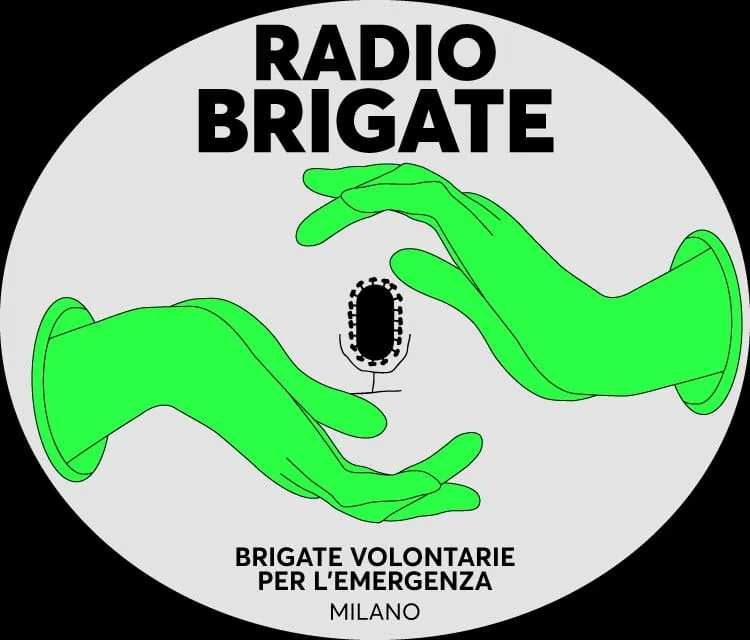
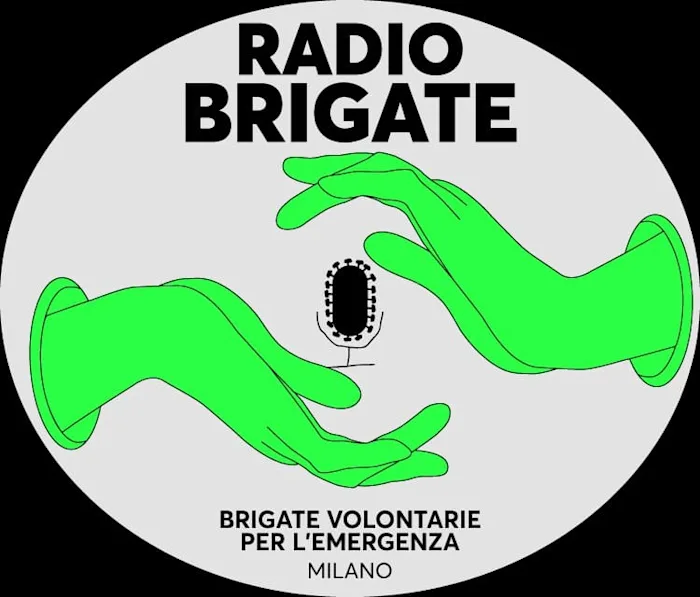
Many initiatives were born, from tutorials about how to defend against COVID-19, to new radio and streaming sites, meetings (especially on Zoom) filled with people who often have never even met, some from all over the world. The absurdity of it is that we are experiencing a more conscious use of our devices. While before we perceived them as instruments of alienation and distraction, we now use them better as ways of sharing knowledge.
As for our group, we had been facing a period of great fragmentation. Ironically, the work of the brigades and the presence of a common but invisible enemy now involves everyone, since we are all touched by the same problem.
What is the situation in working-class neighbourhoods? How are the cops and the army behaving? In Milan, as we know, the police are generally very aggressive, but their attitude can change according to zone, acting civil enough and “teacherly” in more well-to-do neighbourhoods, and with the arrogant and violent “colonizing” approach in more working-class neighbourhoods.
The situation in the working-class districts of Milan changes depending on the area. In the densely-populated areas, filled with small and overcrowded houses, and mainly inhabited by foreigners, life continues to take place in the streets. Walking around in neighbourhoods like Giambellino or via Padova, you might see smaller food shops still open, creating spaces to meet for people who seem unconcerned with the directions issued by the authorities to stay at home. The police patrol the streets, but not in an overly dominating fashion, mostly trying to limit these numerous gatherings. The army was already present in some areas with an anti-terrorist function. Since the 23rd of March we’ve seen their number increasing and they have begun to patrol as public officials with the possibility of stopping and asking for documents or ID. It seems that for now, they don’t seem particularly comfortable in this role, showing a certain reluctance in being aggressive. In neighbourhoods where the presence of the police is usually regarded with hostility, the discouragement of gatherings and “dangerous” kinds of behaviour becomes difficult to put into practice.
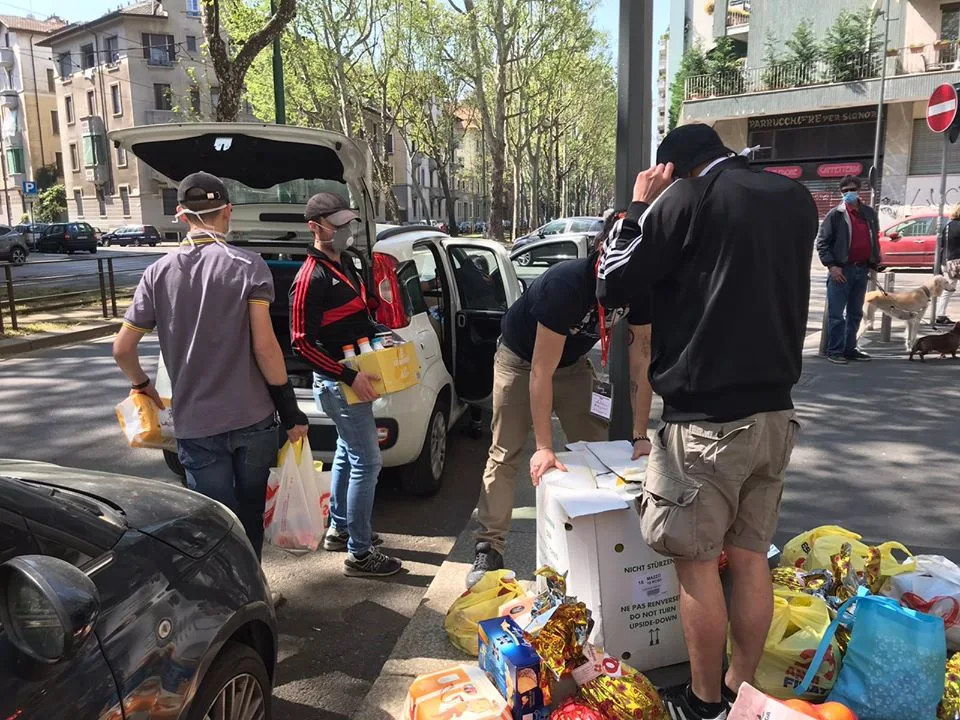
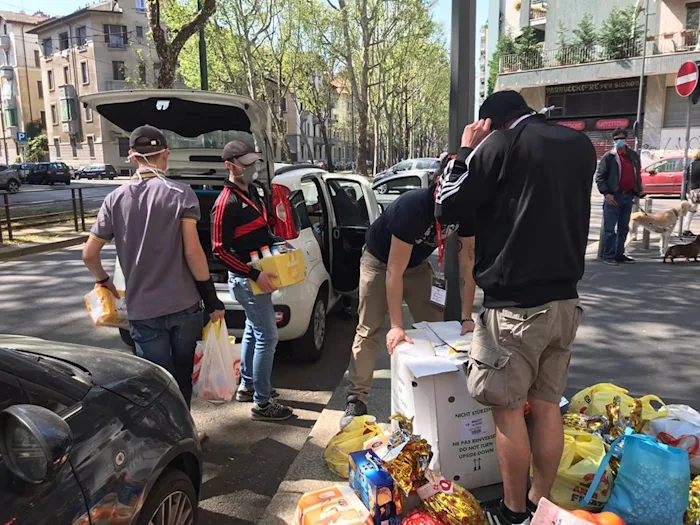
Other working-class neighbourhoods on the outskirts, where people normally only go home to sleep, seem deserted. After the closing of the shops inside the shopping centres (the only places in these areas where social life takes place), life has died out, and everyone hides in their own apartments. In the last few days, media-induced fears of the dangers of walking and doing sports in parks have spread, with people looking out from their balconies and railing against neighbours who go out to take a walk in the yard, or even call the police.
And it’s obvious that the slogan #iorestoacasa (#Istayathome) is not considered relevant to everyone. Those who can afford to pay rent and have a job are locked in their homes, doing online shopping, while the rest of the population, either precarious or unemployed, working in logistics or infrastructure, experience a quite different situation. A very wide gap between the classes has opened. Confindustria (General Confederation of Italian Industry) forced workers to keep on working in factories without any health and safety precautions.
So in working-class neighbourhoods, many people are continuing to work. The increase of police and military in the streets is considerable but there isn’t a huge gap between neighborhoods: they are simply everywhere. We are seeing another phenomenon too, which is the becoming-policemen of normal citizens, which is perhaps stronger in bourgeois residential areas: there have been many episodes of people denouncing others to the police, or just people shouting “Go home!” to people walking in the street. Those who have been most affected by these severe measures have been homeless people and migrants.
How do the volunteer brigades work? How do you handle the relationship between institutions (the state, local council, NGOs…)? How do you train those who participate? Where did the idea originate? How many people are involved? Are you trying to extend the idea to the whole of Italy?
The Brigades were born out of an idea that circulated as word of mouth on social media and it quickly became viral. The idea which came out of it is that we can obviously talk about who are responsible for all this, and they will have to pay the consequences, but in our current situation in which there is a diffuse sense of fear among people, we have to look out for the community, especially those of us who have experience with many different forms of organization, since we have learned in these years to manage with “extreme” situations, to act with courage, for the sake of everyone. We were inspired by several examples of mutual aid and organizations which worked throughout Italy after the earthquakes in the center of Italy (in the 2000s).
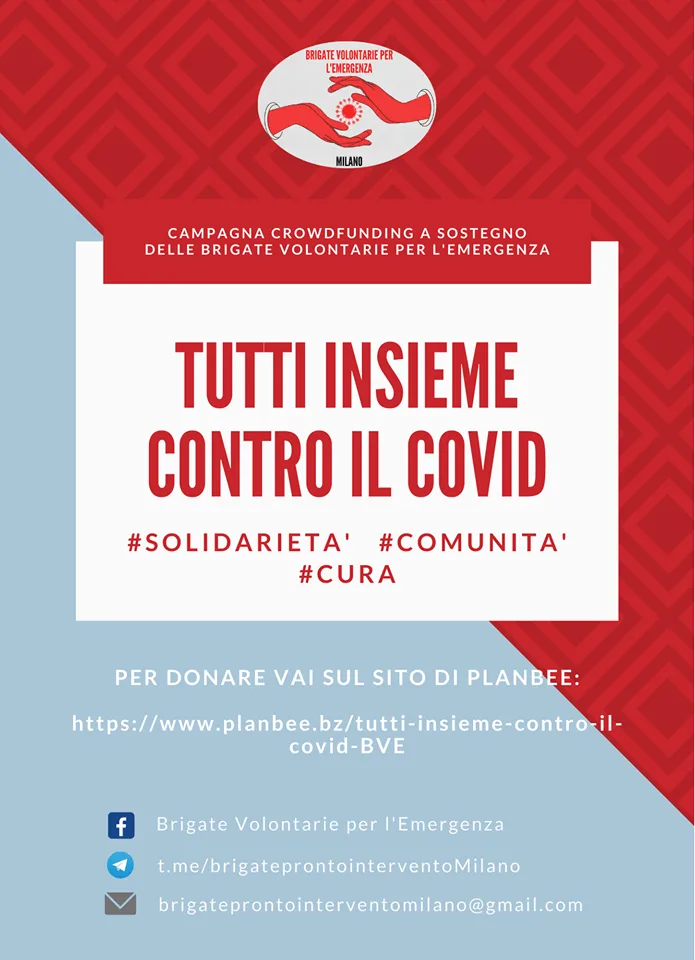
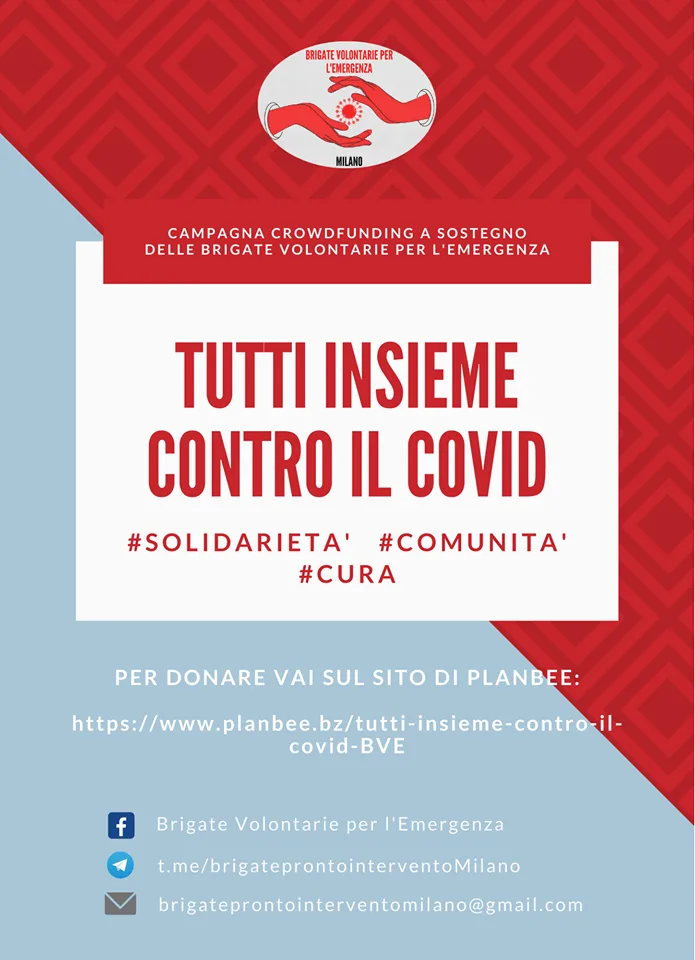
We understood pretty quickly that this situation was much larger than us, and that it wouldn’t be sufficient to do things autonomously or even on the national level, so that we would be vulnerable from multiple sides, especially vis-a-vis repression. If you’re found out of your house without any particular reason they can sanction you.
We looked for an organization that could give us the possibility of having an official status, and found Emergency, the humanitarian organization which provides aid in war situations and which has its offices in Milan. Through this we were able to construct an infrastructure which legitimates us and which mediates between us and the Milan local council. In the same way that we created the “Brigades” through our personal involvement, which began from social media and word-of-mouth, we also found individuals for each area to coordinate the groups. This structure has organized training sessions, first of all for the group leaders, who in turn started training the people in their own groups. The structure also allowed us to have passes in order to be able to move around the city freely. Currently we have more than 200 volunteers and many people on the waiting list to be trained and many others who continue to write saying that they would like to join. We are managing to cover all the 9 districts of Milan and the calls are increasing daily. In some areas we are connected to social centers or self-organized spaces which make up the base of the Brigades.
Our structures are being tested daily but it is still small and spread out, and we are being contacted by people from other parts of Italy who are beginning to organize themselves in the same way. Our goal is to create an infrastructure across the whole of Italy.
Can you update us on the situation in the prisons? Are there ways to stay in contact with people inside? (Here they gave a “bonus” of €40 for every inmate, which allow them to make more phone calls, and they gave free TV access to everyone, hoping in this way to placate unrest)
After the riots, and the deaths in prison, and the first case of Covid-19 in the Voghera prison, the “Cura Italia” (“Heal Italy”) decree established new orders on how to confront the pandemic in penitentiary institutions: house arrest and electronic tags for those serving less than 18 months; those under 6 months and minors are to be directly sent home, without tags.
Beyond this, it was established that those accused of having participated in the revolts of March 9th/10th will not be allowed to benefit from these alternative measures. Following the protests many sections were destroyed, and for this reason there has been a decrease of 2000 prison places, due to works that have to be carried out immediately.
News reached us (from allies and family members) of many reprisals in the Opera prison: the inmates report going hungry and fearing for themselves, they describe being denied TV, food, showers, phone calls; having only half an hour of air, and being beaten, hands and bones broken; “riot police entered the cells and beat us up in the dark”; the guards took away cooking materials and gave the inmates only water and cigarettes.
After the events of March many inmates were separated in order to put down the unrest; this was the case in Ferrara and Alessandria; 60 inmates in Melfi, 500 in Modena, 107 in Foggia, and 60 in Naples, were transported on a military boat belonging to the Italian navy to the correctional facility on the island of Procida; 650 from Poggioreale were separated and put into different jails in Brindisi, Messina, Bari, Lagonegro, Melfi, Potenza and Reggio Calabria.
Day after day the numbers of guards and inmates infected and testing positive increases.
At this link you can find the account of Nicoletta Dosio on the situation in the prison of Vallette in Turin here [in Italian].
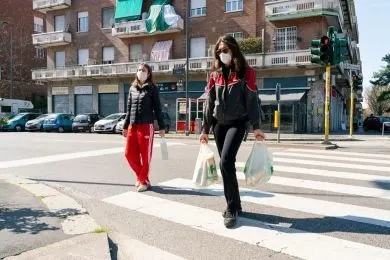
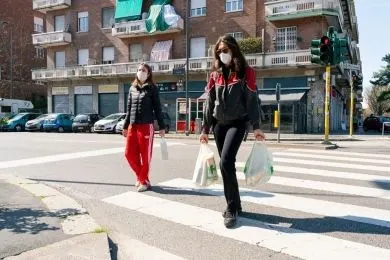
Do you have any advice on how to manage – emotionally, psychologically – the fact of having to stay inside all the time? Here it is only the third day and many are still experiencing it almost as though it were a game. What are your reflections after ten days?
The first thing we believe is important is not to allow oneself to be infantilized, but to assume responsibility. Despite the state wanting the former, it is important to understand that this situation concerns us all, our loved ones, and the more vulnerable members of our society both on the social and physical level. Staying inside all the time with this awareness can really notably help our sense of self-discipline. Moreover, moments like these, which people who have experienced house arrests know well, are moments to keep oneself occupied to the utmost. It is almost redundant to say: study, train, reflect. In the end I maintain that it is important to treat it as a kind of “suspended time” when we can finally concentrate on our collective strategies (or the lack of these), also in the light of recent events, without the stress or the lack of time caused by the frenetic pace of our normal daily routines (work, militancy, etc.)
At first it seems like a game, especially for the many of us who have for a long time been trying to flee hyper-productivity. We have found ourselves obviously amused by the hysteria of people, who in the first hours became enraged at supermarkets and shops who sold face masks. Added to this is the sensation of living in an episode of Black Mirror – the streets are empty and the few people on the streets are walking around with masks on.
At first we passed the time reading, discovering things on the internet or having dinners restricted to a small number of friends, where obviously the main theme of discussion was the virus. Slowly as the days passed we began to understand the seriousness of what was happening: people are now all stuck at home and our contact with the outside world has been reduced to three or four people, which is, the people we were always in contact with. Further contact was avoided for good reason, and those with family over a certain age stopped all contact with others. For now, on the emotional and psychological level we keep struggling, perhaps because the Brigades give a practical sense to these days, and also because we are seeing the exasperating effects of the virus on capitalism: people fighting outside supermarkets in queues, or because social distancing is not being kept up, or other kinds of unrestrained egotism.
At this point the question has a global importance and we have the possibility to turn this into a potential and to grow the network we have been building for years, though, on the other hand, power also has this potential. It is not incidental that in these days we have been able to have virtual assemblies with comrades from many different places, where we have been able to discuss the experience of the Brigades.
The idea is that when our methods will have been tested a little we will also be able to go further than just helping out those who need it most. Maybe one day on the streets there will only be the brigades and the police and this could be an interesting scenario. We have to consider however that the state and global capitalism are using this moment as a kind of experiment on a massive scale and we cannot underestimate this; we have to remain attentive and to study the movements of power to try to understand what will happen afterwards. Perhaps certain things could enter into the daily lives of people, for example this question of sociality and work. The experiment that is happening is moving on different levels; from the repression of those who leave the house to “tele-working”, the many working from home. Schools are continuing to conduct courses online, thus in part people at home are being employed to “produce” in a new way.
Further, the virus, being immaterial and invisible, seems insurmountable and so it legitimates the state even more to project a voice that everyone necessarily listens to, keeping us all suspended since no one has any idea when this will end. There is an extreme pressure exerted upon individual responsibility so as to move away from all kind of social tension which might allow a realization of who the real people responsible for this are.
It’s a strange feeling leaving the house alone to go to the supermarket. Even if people don’t talk to one another, many people exchange complicit looks, since we all now have this in common, even if we’ve never known these people as friends, in the sense that they’ve never been this side of the barricade. This should make us reflect. We have to remain immersed in this situation and be strong in order to turn the situation in the right direction when the time comes.
Given that protests, demonstrations, and street presence are now impossible, what are ways of maintaining pressure on the authorities, in order to give voice to objections to the discourse that says “let’s save the economy at all costs”?
In this respect the most combative elements have been the militant unions such as SI COBAS (a small communist union operating on the national level), which are also the most directly involved given that, as we said, the majority of factories remain open undisturbed, in flagrant disregard of all the warnings to stay at home. So the voice of opposition has for now been principally represented by strikes, in which however, most of us don’t have the occasion to physically participate. The situation in prisons is different; groups of comrades are trying to get organised even if also here the difficulties are not at all few. After the first wave of protests in prisons, protests are continuing but they have been repressed with impunity, and the main task now is getting news out from inside, and to circulate it as much as possible.
We have to take account of people’s emotional reactions to what is happening, and acknowledge those people who have lost a relative or loved one to the virus. It’s difficult to imagine a movement exploding as yet, in this context. On top of this there is the fact that in Italy over the last years movements have suffered many setbacks and steps backward in terms of confronting power, and there is no united front, nor strong position from which to begin. Everything is very fragmented and so what we manage to bring forwards in struggle is a reflection of this pacification.
One practical example was the 8th of March – the global trans-feminist strike. Already being in the period of the quarantine we had to think what actions people could do. Hundreds of initiatives came about around the city; a new radio program, and many actions, from banners and posters, to writing, to whatever other form of protest which allowed people to feel involved. But nothing that meant direct conflict.
It’s moreover clear that contradictions have emerged; from one side the politicians who have made many gross errors, the public health system which is falling apart (as a result of the cuts over the last years), the fact of the middle class being at home, while delivery workers are in the streets delivering food, Confindustria deciding not to close down production and the larger unions which are playing around, the logistics workers who continue to work without any safety measures, the workers with unprotected faces who are risking their lives; on the other side, the campaign emphasizing individual responsibility of #iorestoacasa (#Istayathome) which is, of course, a way of concealing the truth of the situation.
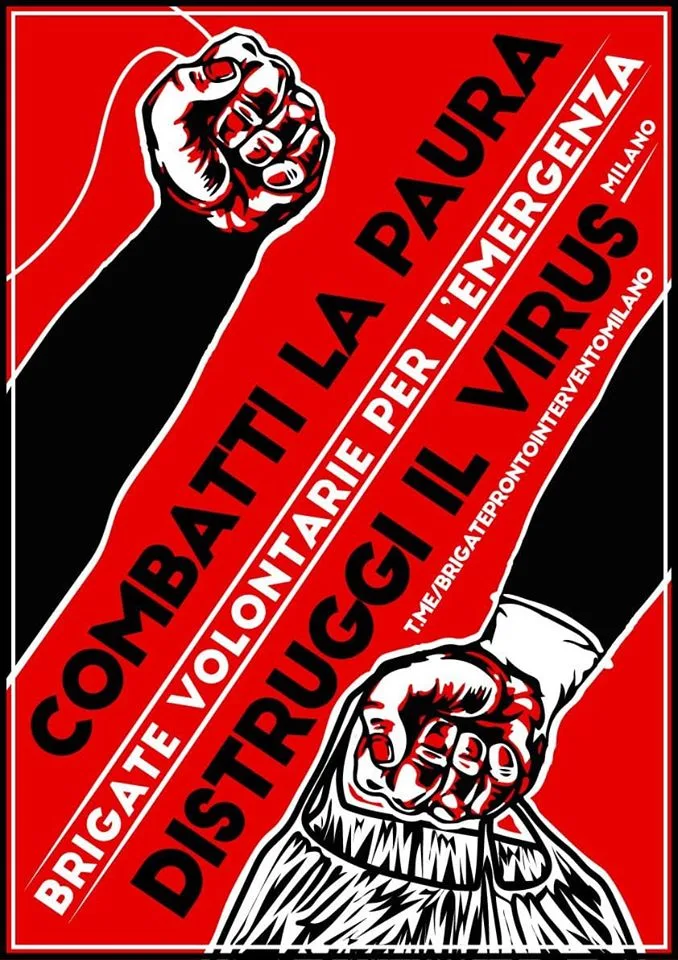
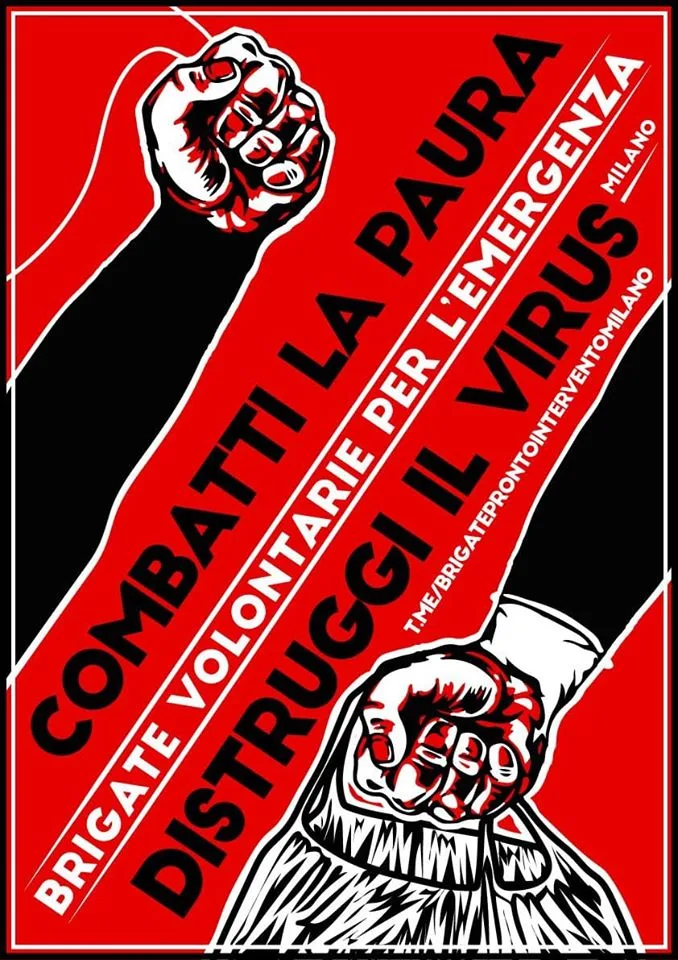
Anger is coming to the surface, the autonomous unions have begun their strikes and are distributing provisions and masks to those in need, trying to impose a stop on production; the precarious workers have opened disputes in the hope of obtaining an income during the quarantine; and people are making appeals trying to stop online shopping because it puts those people who are making the deliveries at risk. The workers at the Amazon offices in Milan went on strike. As yet it hasn’t been possible to construct a strong position on how to give a positive sense to economic failure. 25 million unemployed people are expected once this is all over, and fear is high. For now it is very difficult but we think that with the work of the brigades it will be possible to construct a strong common position.
Have you noticed any new forms of solidarity among generations and in neighborhoods? What’s happening out of town? Do you have any updates from comrades in the countryside?
Our comrades living in the countryside describe a much quieter picture, free from the anxiety about contagion that one feels in the city. It’s easier for people to move around because controls are limited. You can buy food and any kind of “essentials” without difficulty, and farms that are still operating still receive the supplies they need. They’re dealing with labour shortages though.
Have there been moments of panic, people fleeing from big cities? Leaving Northern Italy to go south? (We had a huge flow of “bourgeois” migration here. Many people have left to be isolation in more comfortable conditions in their countryside or seaside holiday home – thus threatening remote areas, typically inhabited by the elderly, with the risk of contagion)
Yes, panic broke out on the evening of March 8th. A lot of people took trains from Milan and left Lombardy. All because of leaked news about the government’s decision to isolate the region. Obviously, having hundreds of people crammed into a train certainly didn’t help prevent the virus from leaving Lombardy. Sure enough it had the opposite effect, leading to an increasingly higher number of infected people in Southern Italy in the following days. This kind of panic-induced internal migration continued for some days, with such intensity that some Southern regions decided to close their borders. At the beginning many people perceived the quarantine as a holiday, rushing towards ski slopes, beach resorts and second homes.
Yes, as I said, it has been a crescendo. In Northern Italy, for example, the start of quarantine took place when lots of people were on holidays, so many were stuck in the mountains or in their country houses. We witnessed great panic when the government decided to quarantine the whole of Lombardy – creating the so-called “red zone”. When the news came out, there was an exodus. Southern people who work or study in the North traveled back home en masse. This was a totally irresponsible thing to do, insofar as they risked bringing the virus to other areas, especially since young people can be healthy carriers with often no symptoms at all. The sheer selfishness of this gesture brought out all the counter-revolutionary power of the Italian family.
How does the contrast between the North and South feel now? Can we say that the tables have turned regarding the famous “Southern question”? Any thoughts?
This is not about the classic, even ironized, North-South opposition. The issue must be considered in relation to the different healthcare systems. Of course, we are not happy that the crisis broke out in the region where we live. Still, Lombardy is the richest region, with the best healthcare system in Italy and probably Europe (despite a succession of administrations cutting its budget). So we can be kind of relieved that it happened here. The Southern healthcare system has many more issues. Some problems are related to the staff, but the biggest issue is the inadequacy of infrastructure. A crisis like the one we’re having in the North would probably have brought the South to its knees.
In the last few days, the number of new patients in other regions – mostly Puglia and Campania, respectively South and Central Italy – has been increasing. We don’t really know how they’re facing the crisis (I mean, whether there is a network of mutual aid organizations and how they work), we’d need to ask people and healthcare personnel in those areas to get a better picture of it.
Some friends and relatives told us they’re very afraid, as though the epidemic had broken out there, as though Bergamo were a Southern city, so they respect the “safety” measures carefully. I don’t think we can say the tables have turned on the “Southern question”. Many thought they could get away with leaving the North and going back home as soon as the lockdown was imposed – they proved to be very selfish and harmful to those who had a chance not to be as affected by the epidemic. Because of this grave error we risk having ten Codognos instead of one. People who left the red zones are likely to infect relatives in isolated areas.
There is still a great economic and social divide between the North and the South, we know that pretty well. In Sicily, in Calabria or in Basilicata, people are very aware that hospitals do not have adequate means and tools to face this kind of emergency. As long as people have to stay at home it will be impossible to discuss these issues – we’ll probably have to wait until everything is over.
The North is the new South! Or not. Originally, the North of Italy (great center of production on an international scale) was floored by the epidemic and showed its weaknesses. It became the laughingstock of countries all around the world – nobody accepted tourists or travelers from Northern Italy. A great blow that hurt the pride of the colonizers, who had always been free to roam around the world. For once they found themselves on the ‘not welcome’ list. Obviously the North-South relationship in Italy has changed and become an object of humor. But what is actually very worrying is that the healthcare system in Lombardy, which is despite all one the most efficient in the country, is collapsing. So if the virus were to reach the South, the situation would be truly dramatic.
What is the general feeling about what the government is doing? Is it considered partly responsible for the situation, or are its efforts to face the crisis appreciated?
For what our perceptions are worth, the government is generally receiving good support from the people. Prime Minister Conte is considered a wise politician, and the fact that Italy acted immediately and firmly made people forget many doubts they had at the beginning. In fact, until the first weeks of March, most Northern politicians were pressured by business leaders into keeping the borders open and letting Milan run at full capacity. Moreover, the government has taken strong measures concerning healthcare and movement of goods and people, but gave in to the pressure of Confindustria. So big cities are under great restrictions, whereas in the rest of the region industries and businesses, even the non-essential ones, continue their activities adopting only laughable safety measures. No decision has been made on the issue of overcrowded prisons, despite many judges and courts asking for new policies. But people have become more aware of the situation – the current climate of emergency makes everyone more sensitive, even past the issue of hospital capacity. The stern but inspiring campaigns in favor of prisoners have moved many people as well. We should consider in this respect the old nationalist cliché about Italians selflessly coming together during hard times to fight for the community, which has resurfaced in this situation. “Sovereignist” leaders like Salvini and Meloni, surprisingly, are at the moment managing to act under the radar. Their beloved game of finding someone else to blame for every single problem and identifying an enemy cannot be played so easily in times when there are these appeals to unity, so they’re clutching at straws. The feeling is that they’re preparing for the aftermath, when the emergency will be over and we’ll have to rebuild everything from the ground up.
As I said, the situation is controversial. At first the government made some incredible mistakes, and revealed that it wasn’t able to respond to this emergency adequately. We’ve seen this in every crisis that affected the country in the last decades, from the earthquakes in central Italy to the collapse of the Morandi bridge in Genoa. There are many issues we have to deal with, most importantly budget cuts to the healthcare system and the lack of protections for logistics workers. We are talking about people dying here not because they are crushed by a crane, but because they are attacked by a virus, which actually affects everyone without distinction. People are therefore intensely focused on the issue but are “waiting for instructions from above”.
Many political collectives have highlighted the link between the capitalist system and the virus, and how it is transmitted. But for the time being, unfortunately, this is all talk, with a kind of academic character, especially given that we can’t even leave our homes.
How are people reacting to the plans for generalized digital surveillance (as already implemented in Israel or Iran)? Is it perceived as a “necessary evil”? Are there any ideas to counter these policies? Is the issue being addressed or is the health crisis preventing it?
So far it is not being addressed that much, certainly not at the level of general public opinion. As far as activist groups are concerned, it’s a bit complicated because the debate is now quite mixed up. From the beginning, philosopher Giorgio Agamben focused on the measures relating to the “state of exception”, and their possible consequences. Maybe he did so with a certain smugness and without caring too much about being understood correctly, so he was accused of minimizing the health crisis. The result is that now most of the comrades have slipped into a somewhat sterile debate between supporters and critics of the imposition of the state of exception. The critics accuse the supporters of being too abstract in front of real emergencies such as safety conditions in factories or prisons. As a result, it’s not easy to focus on the whole picture and avoid ideological squabbles.
We can talk about what has been happening in the last weeks. On March 19th, AgCom (national regulatory authorities for Italian communication industries) issued a press release asking social networks like Youtube, Facebook and Twitter to remove videos reporting false information or information from unreliable sources. It is the first time in Italy since 1948 that some fundamental freedoms, such as the freedom of movement, of assembly, and of expression, have been suspended. We will witness the effects of this measure in the upcoming days. The risk is that, the state taking advantage of an “emergency” situation, we could emerge from the catastrophe in much worse cultural conditions than when we entered it.
Personally, I’m very worried about this question. Many people are working from home and online 24/7, and are wondering about the future of our society. We fear that our movements will be GPS-tracked to check who is respecting the quarantine and who is not. On the other hand, many people see this situation as a positive change for the environment – since traffic has slowed, we experienced a significant decrease in air pollution, which is a major issue in Milan. So many now believe that this could also solve other problems. For the time being we need our devices to remain connected, but this situation will certainly have a significant impact on our lives.
What’s the general opinion on how other countries are approaching the situation? Were people angry at the thoughtlessness of countries still untouched by the pandemic?
Surely one of the most widespread feelings is disbelief and amazement. Italy had watched from afar the Chinese government dealing with the pandemic, a country that seems far away but is of course not so distant in our globalized world. However, we can’t understand how it is possible that European countries did not act as soon as they sensed what was happening in Italy. The example was there, before everyone’s eyes, even sometimes just a few kilometers away. This highlights once again the inadequacy of our leaders as well as our lack of preparation, awareness and independent sources of information.
Anti-European and Eurosceptic feelings are as always resurfacing. Some see the EU as a mindless bloodsucker that refuses to support Italy during this emergency. The best thing is probably the general discredit that people like Trump or Boris Johnson are suffering. In the midst of the crisis, their bullshit now sounds dangerous and crazy even to those who previously admired them as strong and charismatic leaders.
This is significant. We were very angry at first, when we couldn’t understand why they kept the information about when the virus first appeared concealed. Many people were disappointed in how Germany and England responded to this emergency. There’s also fear that if the pandemic breaks out in a serious way in the US, a huge number of people will die as a result of the private healthcare system. The only positive news we saw was that Bolsonaro came into contact with someone infected with Covid-19. That could save many more lives! However, at the moment, attention remains focused on our country, with 900 deaths per day and new outbreaks.
Can you imagine things on a longer scale? Do you think it’s possible to predict how things will be in the longer term? It almost seems like there will be no return to normality. What do you think will happen in the next few months?
It’s hard to say. It’s very difficult to make predictions while all these different newspapers and media throw news at us. It’s hard to reflect while isolated. Everyone knows that the more you stay at home, the less fresh air gets to your head. One day we experience pessimism and the next day hope, or at least you see new chances for some unexpected turn of events. Surely the months to come will be harder and harder. We’ll have to be ready to go out again and see how this situation has changed things. But how they will have changed, as I said, is impossible for us to know.
It’s hard to imagine what will happen now because we don’t know how long the lockdown will last. The whole world will change for sure. It’s also difficult to express “cynical” or critical ideas as many people are very sensitive about the pandemic. Some issues will be affected – the Mediterranean geopolitical scenario, Italy’s alliance with China for the new ‘silk road’ in Africa, the war in Syria that brings millions of migrants to Europe. It is no coincidence that borders are now closed all over the world, this seems to us as well to be a form of experimentation. 10 years ago we were studying the NATO Urban Operations in the Year 2020 report, and now here we are.
An interesting scenario could open up for us. We spent years traveling the world to build networks wherever people tried to confront the government, often getting in trouble with local authorities. Now we are experiencing a worldwide scenario that unites us all, especially in the West. We have the opportunity to create a common model that can apply to many places in the world. Once the emergency is over, that can legitimize us to speak up against those who have created these problems. For the time being, we can’t say what our next steps will be. We know that some activist groups from all over the country are planning to mobilize, inspired by the Volunteer Brigades. In order to create a common trajectory, we will need to connect with this broader viewpoint.
March, 2020.